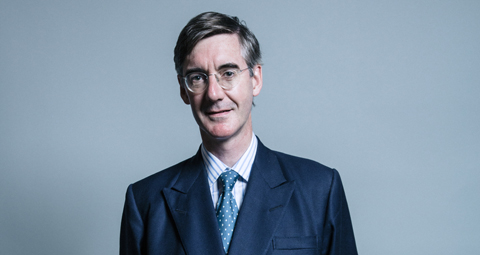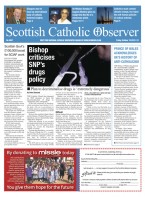September 15 | ![]() 0 COMMENTS
0 COMMENTS ![]() print
print

Could this be our first Catholic Prime Minister?
ANOTHONY HORAN assesses the ambitions of Jacob Rees-Mogg. - BY ANOTHONY HORAN
There has never been a Catholic Prime Minister in Westminster, or First Minister at Holyrood. And in today’s culture of aggressive secularism where any amount of Christian belief is seemingly unwelcome in politics, you would think that now would be the least likely time for this to change. Enter Jacob Rees-Mogg.
The eccentric Conservative Member of Parliament for North East Somerset is said to be lining up a bid to become the party’s next leader and is seemingly a favourite among grassroots members.
Whether or not his conservative Catholicism will have a negative impact on any campaign remains to be seen, but even the bookmakers think Mr Rees-Mogg, regular Mass-goer with six children, is in with a good shout.
This is despite an appearance last week on the Good Morning Britain programme when, true to his Catholic beliefs and values, he said that abortion is ‘morally indefensible’ even in cases of rape, and stated that marriage is a Sacrament that cannot be redefined by parliament.
Cue the mainstream media uproar.
It is fascinating to see just how perplexed the media can be when faced with genuine and relevant moral questions.
They cannot seem to get their head around the fact that some people, including Jacob Rees-Mogg, firmly believe in the reality of the existence of human life from conception and that all life is deserving of protection.
In a secular world where equality is deemed the go-to principle, it is actually a fine example of unconditional, orthodox equality. Yet it is not embraced. Why? Because it is a fundamentally Christian principle and the secularised mainstream media in the west will brook no regard to Christian thought or teaching. Just ask Tim Farron.
Sadly, Mr Rees-Mogg missed a useful opportunity on the TV programme to evangelise the nation on the reasons why the Catholic Church is against abortion, particularly in cases of rape. He might, for example, have argued that no child should be punished with death for the wrongs of their father. He might have also explained that his stance on these issues does not only come to him by Faith but also by reason. But, notwithstanding missed opportunities, it is refreshing to see someone be open about their religious beliefs and honest about how they play a critical role in shaping his own values.
Mr Rees-Mogg, like anyone, will have skeletons in his closet and they may include support for questionable policies, but his love for the Catholic Faith and his desire to protect innocent unborn children appear to be beyond question.
Here we have a man who is willing to put his Faith on the line and give the public an alternative to the humdrum, elite, secular, liberal culture that pervades UK politics.
Sure, he is against the idea that marriage can somehow be redefined by parliament and is in favour of marriage as being the preserve of one man and one woman. Sure, he is against abortion and instead believes in true equality of opportunity for unborn people as well as those who are already born.
These are not reasons to dismiss someone as unsuitable for high public office, yet the mainstream media will now set the wheels in motion to make Mr Rees-Mogg’s life very uncomfortable in the hope that intense public pressure and scrutiny will make even the very thought of being thrust further into the spotlight a disastrous prospect.
So will he go the distance? Consider the politician’s rise to prominence in his own constituency. Since he first stood in 1997, Mr Rees-Mogg has seen his share of the vote increase year on year from 3,669 to 28,992 in 2017. His share has never dropped in that time, and this in the midst of being a devoutly Catholic man and politician. What this tells us is that the people on the ground, the electorate, do not necessarily share the views of the mainstream media and its fanatical anti-Christian rhetoric.
Are there lessons for us in this bold, forthright Catholic witness? If an unashamed Catholic can rise to prominence in the English political system, could someone do the same in Scotland? Or is the aggressive secularism of Scottish politics now so intense that politicians of Faith need not apply?
– Anthony Horan is the director of the Catholic Parliamentary Office.










